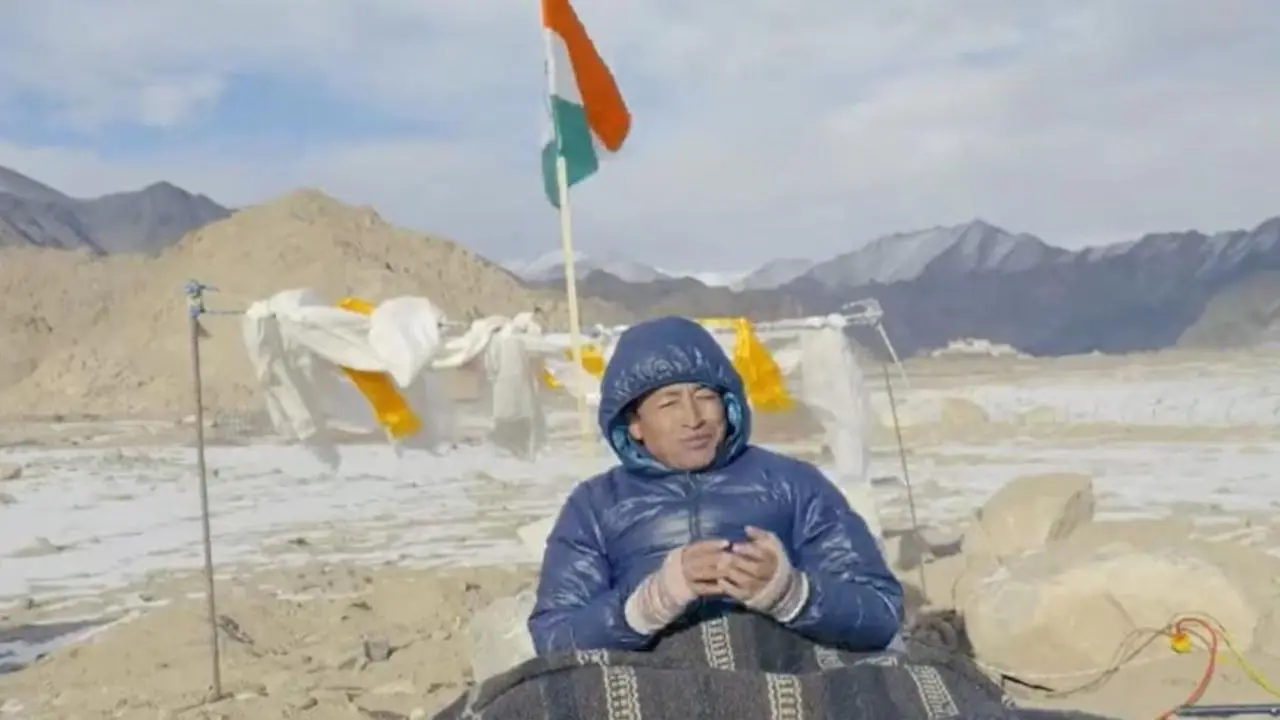Nestled between the towering peaks of the Himalayas, the remote region of Ladakh is witnessing a movement that could very well dictate its future. At the forefront of that movement is Sonam Wangchuk, Ladakh’s very own eco-warrior, armed not with weapons but with an unyielding resolve and a trick or two up his sleeves, we hope.
In a move that’s part Gandhi, part Bear Grylls, Wangchuk has been braving the cold in a fast that screams ‘climate action’ louder than a melting glacier. His mission? To coax the powers-that-be into granting Ladakh the ecological shield he claims it so desperately needs.
Ladakh’s Tryst with Destiny
Ladakh’s tale took a dramatic turn in 2019 when it was carved out from Jammu and Kashmir, donning the hat of a union territory (UT). While some hailed it as a masterstroke for development, others feared it opened up a Pandora’s box for environmental exploitation. Wangchuk’s fast is a stark reminder now that all is not well in this high-altitude paradise.
The Promise and the Protest: Modi’s Moment of Truth
In the political theatre of India, promises are the script, and nobody knows the lines better than Prime Minister Narendra Modi. His pledge to the people of Ladakh was clear: development, autonomy, and preservation. Yet, as Sonam Wangchuk’s climate fast enters its third week, the spotlight turns to Modi, challenging him to turn his words into action.
Ladakh’s transition to a UT in 2019 was a plot twist that left many feeling like extras in their own story as it hit the opposition right in the dead centre of their bemused faces. The promise of development, however, came with fears of environmental exploitation and cultural erosion. The fast is not just a protest, Wangchuk has observed; it’s a reminder of the unfulfilled assurances that now hang in the cold Ladakhi air.
Wangchuk’s message to Modi is steeped in the ethos of Lord Ram: “Raghukul reet sada chali aaye, praan jaaye par vachan naa jaaye” (The tradition of the Raghu clan has always been that promises are kept, even at the cost of life). It’s a poetic nudge to the Prime Minister to honour his commitments and prove his devotion to the ideals he champions.
As the protests gain momentum, the ball is in Modi’s court. Will he heed the call of the Ladakhi people, or will their demands fade into the background noise of political expediency? The stage is set, and the world is watching to see if Modi will deliver on his promises or if his government will be remembered as the “Stepmother of Democracy” in the high-altitude drama of Ladakh.
The March of the Discontent: Ladakh’s Looming Showdown
As Sonam Wangchuk concludes his 21-day fast, the movement gathers steam and plans are underway for a bold move – a march towards the Chinese border. This audacious act is intended to be a symbolic stand against both Chinese encroachment on Ladakhi territory and the perceived greed of corporations threatening the region’s pristine environment.
Ladakh’s shepherds, the backbone of its pastoral way of life, are at the forefront of this discontent. Their traditional grazing routes, vital for their nomadic lifestyle, have been restricted by recent developments. This threatens their very existence and the delicate balance of the Ladakhi ecosystem.
The simmering tensions have reached a boiling point. The march serves as a powerful statement of their determination to protect their land and livelihood.
The Verdict: A Cry for the Future
Sonam Wangchuk’s climate fast transcends the realm of a simple protest. It is a clarion call for a sustainable future not just for Ladakh but for the entire world. As he endures this physical challenge, surrounded by a growing chorus of support, the message is clear: Ladakh’s fate is intricately linked to the health of our planet.
The fragile Himalayan glaciers, Ladakh’s lifeblood, are rapidly receding due to rising temperatures. These glacial reserves feed the mighty Indus river system, a lifeline for millions downstream. If Ladakh falls, the ripple effects will be felt far and wide.
Sonam Wangchuk’s stand is a stark reminder that climate change is not a distant threat; it’s happening now, in real time, with devastating consequences.
We can’t afford to turn a blind eye to Ladakh’s cry for help. Educate yourself, raise awareness, and demand action from your elected officials. Together, we can ensure a future where both Ladakh’s breathtaking landscapes and its rich cultural heritage are preserved for generations to come.
Who is Sonam Wangchuk?
Sonam Wangchuk, a man whose name is synonymous with innovation and sustainability is not your ordinary engineer. He’s a real-life Phunsukh Wangdu/Kosaksi Pasapugazh, the inspirational character from the Hindi blockbuster ‘3 Idiots’ and the lesser-known and moderately successful ‘Nanban’.
Wangchuk’s fame extends beyond the silver screen; he’s the brain behind the ingenious ice stupas, artificial glaciers that store winter water for summer use. His Himalayan Institute of Alternative Ladakh is a testament to his commitment to eco-friendly solutions, blending traditional knowledge with modern science. With numerous accolades, including the Rolex Award for Enterprise, Wangchuk is not just a local hero but a global icon of sustainable development. For more information, visit Nobel Prize.
Here are Sonam Wangchuk’s key demands during his climate fast:
- Constitutional safeguards for Ladakh to protect its fragile ecosystem.
- Statehood for Ladakh first and then autonomy in land and agricultural decisions.
- Ecological protection to prevent the destruction of glaciers and mountains.
- A check on unbridled industrial development and military manoeuvres in the region.
- Protection of Ladakh’s nomads’ prime pastureland from industrial plans and Chinese encroachment.
Despite health concerns, Wangchuk plans to continue his fast, with local supporters taking turns fasting until he can resume. To elaborate further, Sonam Wangchuk is currently advocating for Ladakh’s statehood and inclusion in the Sixth Schedule for land protection and tribal autonomy as part of the fast. He claims Ladakh is losing vital pastureland to industrial expansion and Chinese encroachment and has announced his desire to stage a 10,000-strong Border March of shepherds and farmers to highlight this issue.
Wangchuk also seeks separate Lok Sabha seats for Leh and Kargil, local job creation, and a Public Service Commission for both districts. In a series of tweets and in conversation with numerous media houses, he has expressed concerns about the environmental impact of a proposed 13-gigawatt project, criticising the lack of local consultation before it was given the green signal.
Also read: Digital India’s new champions




